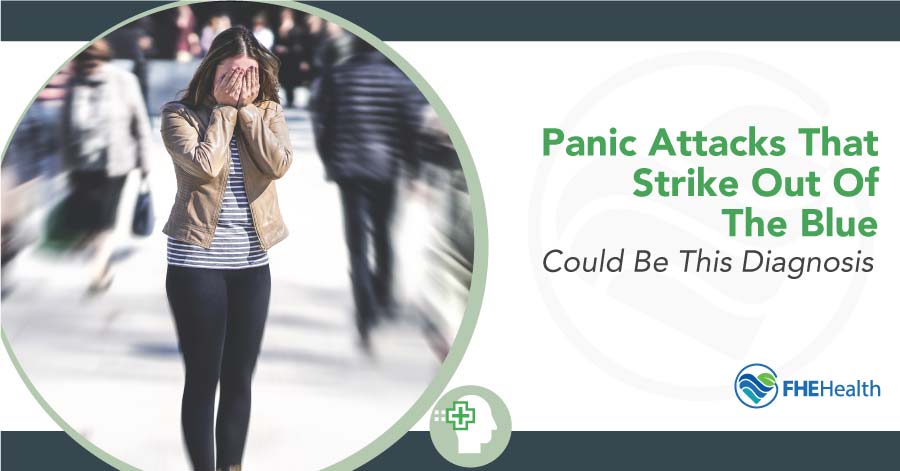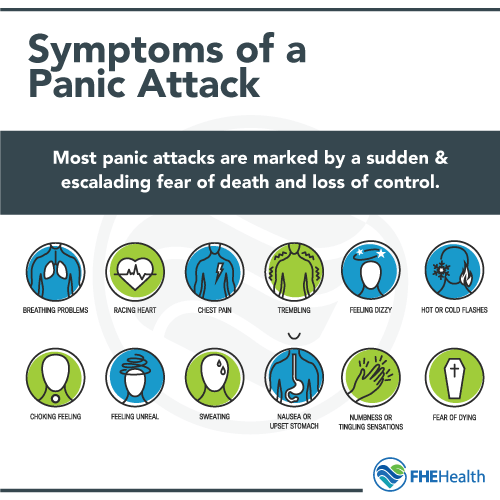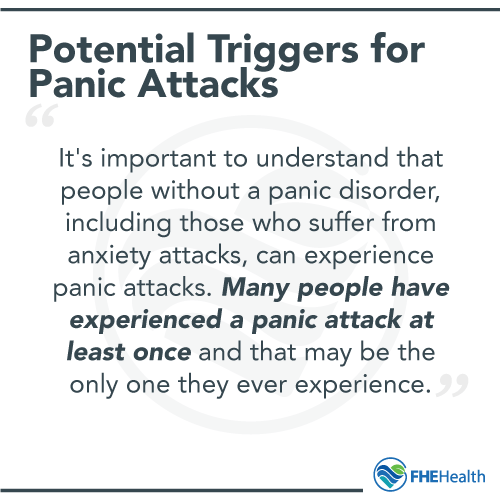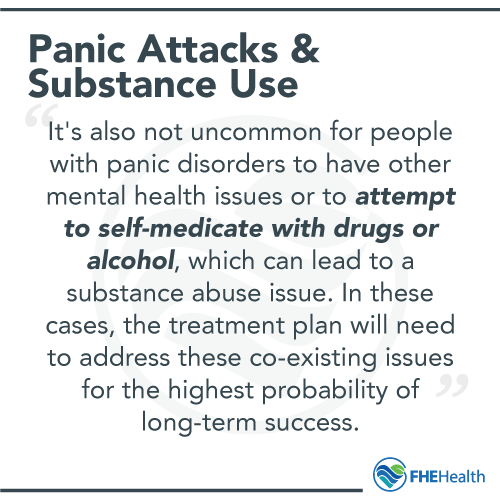
The Anxiety and Depression Association of America estimates that around 6 million people are currently living with a panic disorder. While panic disorders also involve other issues and symptoms, one of the biggest markers is experiencing panic attacks. Having a panic attack, or even a few, throughout the course of your life doesn’t necessarily indicate that you have a panic disorder, but if you deal with panic attacks frequently, here’s what you need to know.
What Panic Attacks Feel Like
 You’re going about your daily life, maybe shopping at the grocery store for tonight’s dinner ingredients. Everything is fine and you’ve had a good day, but suddenly, it feels like there are too many people in the store and the walls are starting to close in. You start to feel uncomfortably warm and like you can’t get enough air. Your breath comes faster and faster until you start to feel light-headed. Your heart feels like it’s going to jump out of your chest, and suddenly you may experience a fear of dying if you stay in the place or situation you’re in.
You’re going about your daily life, maybe shopping at the grocery store for tonight’s dinner ingredients. Everything is fine and you’ve had a good day, but suddenly, it feels like there are too many people in the store and the walls are starting to close in. You start to feel uncomfortably warm and like you can’t get enough air. Your breath comes faster and faster until you start to feel light-headed. Your heart feels like it’s going to jump out of your chest, and suddenly you may experience a fear of dying if you stay in the place or situation you’re in.
An attack can be frightening, and this description above is a common way that people experience panic attacks, but they can also be a sudden and overwhelming feeling of dread. Some people describe it as feeling like something very bad is going to happen or that the world is literally going to end right then, but they can’t actually identify why.
According to Mayo Clinic, common symptoms of a panic attack include:
- Chills
- Shaking or trembling
- Sweating or feeling hot
- Feeling short of breath
- Increased heart rate
- Increased respiratory rate
- Headache
- Nausea
- Stomach pain
- Feeling light-headed
- Dizziness
- Feeling of impending doom
- Feeling detached
- Numbness
Panic attacks usually come on suddenly, and while there are common triggers (discussed below), there isn’t an actual reason for the intense feelings of fear. For example, a person could have a panic attack while just taking a walk around their block. But if that feeling of panic was brought on because the person were being chased by a rabid dog or stuck on railroad tracks with a train coming, that would still put the person into a panic state, but it wouldn’t be an actual panic attack because there is a very clear, real reason for the fear.
Understanding Panic Disorders
The main defining criteria for a panic disorder is having recurring panic attacks that don’t have a specific trigger and exist over an extended period of time. The cause of this medical condition may not be able to be identified, but potential risk factors include a family history of anxiety or panic disorders, a major life stress or change (such as a new baby, divorce or death), a traumatic event or a history of abuse.
It’s important to understand that people without a panic disorder, including those who suffer from symptoms of anxiety and anxiety attacks, can also experience panic attacks. Many people have experienced a panic attack at least once. Women are statistically more likely to suffer from panic attacks than men, and hormones may be a factor for some. People who have phobias or other disorders such as PTSD can also experience panic attacks that are triggered by specific things and aren’t caused by a panic disorder.
Panic disorders are also different from an anxiety disorder, even though an anxiety disorder can and often does involve recurrent panic attacks. There are several types of anxiety disorders, but most of them are tied to an ongoing sense of worry that’s different from the sudden, intense symptoms experienced with a panic attack.
Panic Attack Triggers

When talking about a panic attack, a trigger is something that causes the panic attack to start. It can take time to find the patterns in your panic attacks and be able to identify your triggers, and they can be anything from a certain situational factor — like heights or being in a room with no windows — to sensory aspects like sights and sounds. If the panic attacks are coming from an underlying phobia or PTSD, the triggers may be related to the original incident from which those developed. What triggers a panic attack can be different for everyone, but here are some common ones:
- Feeling a loss of control over a situation
- Crowded rooms or crowds in general
- Strong smells
- Loud noises
- Flashing lights
- Someone getting aggressive or behaving in a threatening manner
While all of these are frequent triggers for those who experience panic attacks, this doesn’t mean you can’t have a panic attack without one of these things. The triggers for a panic attack are incredibly individual, and not having a “common” trigger shouldn’t be a reason for you not to seek treatment or to discount the severity of the issue.
Treatment Options for Panic Disorder or Panic Attacks
 While it may seem like something you just have to live with, panic attacks and panic disorder are treatable, and programs that include things like cognitive behavioral therapy, exposure therapy and medications in their treatment plans can make a big difference in lowering the frequency and intensity of panic attacks and increase your overall quality of life. In many cases, it’s a combination of medication and therapy that helps people be able to start controlling their panic disorder symptoms and get back to a more normal life. Panic disorders can also be a long-term issue that may never completely go away. Medication and therapy strategies may have to be evaluated and adjusted over the years to ensure everything is working the way it’s supposed to.
While it may seem like something you just have to live with, panic attacks and panic disorder are treatable, and programs that include things like cognitive behavioral therapy, exposure therapy and medications in their treatment plans can make a big difference in lowering the frequency and intensity of panic attacks and increase your overall quality of life. In many cases, it’s a combination of medication and therapy that helps people be able to start controlling their panic disorder symptoms and get back to a more normal life. Panic disorders can also be a long-term issue that may never completely go away. Medication and therapy strategies may have to be evaluated and adjusted over the years to ensure everything is working the way it’s supposed to.
It’s also not uncommon for people with panic disorders to have other mental health issues or to attempt to self-medicate with drugs or alcohol, which can lead to a substance abuse issue. In these cases, the treatment plan will need to address these co-existing issues for the highest probability of long-term success.
At FHE Health, we know that dealing with panic attacks or a panic disorder can seriously disrupt your life and keep you from being able to do the things you want to do. Our staff is equipped to develop a personalized treatment plan to help you understand panic disorder and give you the tools to help manage your symptoms now and throughout the rest of your life. Contact us today to find out more about our facility and treatment programs and how we can help.






